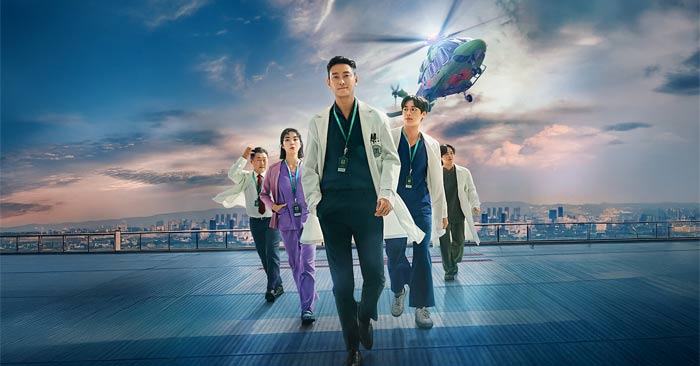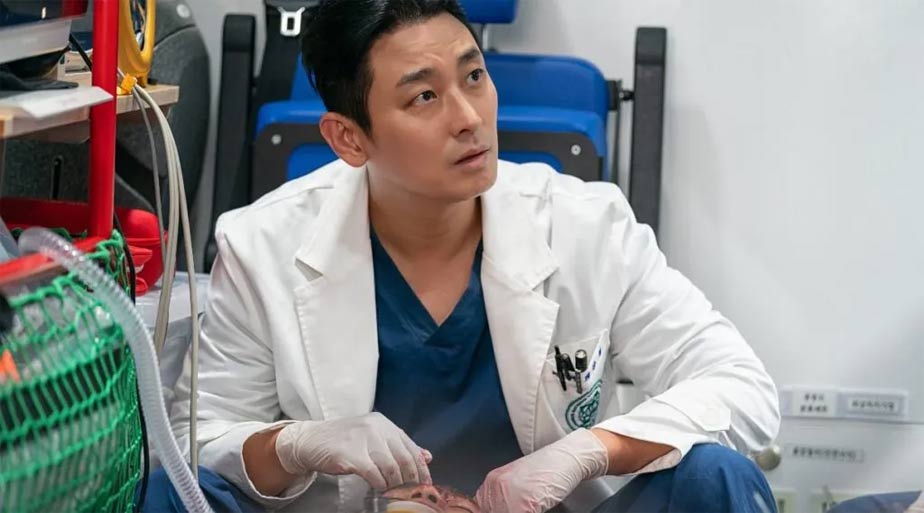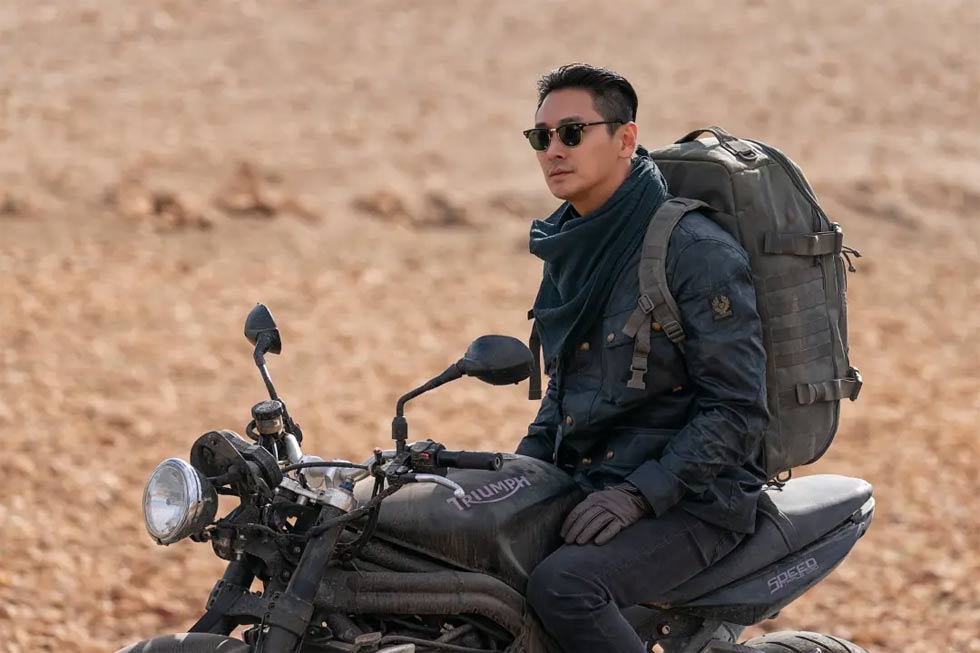Trauma Care Center: The Meaning of The Trauma Code: Heroes on Call's Ending
Trauma Care Center is a medical drama that is currently a hit on Netflix. Trauma Care Center delivers a powerful message about the medical profession in its final episode.
In the opening episode of The Trauma Code: Heroes on Call, Netflix's first Korean medical drama, a doctor rides a motorbike through an active war zone. He weaves through bombed-out buildings and cars, eventually reaching a hospital where a patient in urgent need of medicine is located—but not before being thrown from his bike when a bomb explodes nearby.

These scenes set the tone for the eight-episode Netflix series Trauma Center . The South Korean drama, based on the popular webtoon Trauma Center: Golden Hour by Hansanleega and Hongbichira, follows Dr. Baek Kang-hyuk (Ju Ji-Hoon), a veteran determined to establish a top-notch trauma center at Hankuk University Hospital in Seoul. Using skills he acquired in the war zone, he takes on the challenge of training a medical team to save lives in harsh and dangerous conditions.
Before Dr. Baek was hired, many people died in ambulances on the way to hospitals due to delays and inefficiencies in providing prompt care. Hankuk University Hospital, one of the country's top facilities, lacked a dedicated trauma center to handle such cases. That forced multiple departments of the hospital to take turns handling trauma cases.
Dr. Baek's arrival marks the beginning of a new regime. With the support of the country's Minister of Health and Welfare, Kang Myung-Hui (Kim Sun-young) must navigate the hospital's constant efforts to cut costs while, at the same time, maximizing profits. This directly affects the trauma team. Despite limited resources, the team strives to save lives.
Save lives or increase profits?
The Trauma Code: Heroes on Call makes a powerful statement about how financial concerns can sometimes jeopardize the ability to treat patients successfully. As Dr. Baek saves more lives and strengthens the Trauma Center, costs increase. For the hospital's management, Director Choi Jo-Eun (Kim Eui-Sung) and Director Hong Jae-Hoon (Kim Won-Hae), each life saved is a cost, forcing them to take measures to cut the Trauma Center's budget.
Here is an example: In Episode 6 of Trauma Care Center, a man suffered a serious head injury after falling while climbing Bukhansan Mountain, but the doctors were unable to reach him by helicopter. Dr. Yang Jae-Won (Choo Young-woo), who works with Dr. Baek, explains that he contacted the National Rescue Unit immediately after receiving the emergency call, only to find out that Jung-Heon, the helicopter pilot, had been transferred to an administrative position. The new head of the National Rescue Unit informs Dr. Baek that he cannot use the helicopter as he pleases because it is state property and requires official documentation and approval from his superiors.
This bureaucracy – later revealed to have also stemmed from the hospital director's interference – delayed the injured man's care. Dr. Baek, Jae-Won, and nurse Jang-Mi (Ha Young) travel to the scene of the accident in the hospital's regular ambulance. On the way back to the medical facility, Dr. Baek performs an emergency procedure on the man's head inside the moving ambulance. He then informs the patient's mother that her son is in a vegetative state. Encouraged by Director Hong, the mother requests a detailed investigation into the events that led to her son's condition, suspecting that Dr. Baek's procedure was the cause.
At a press conference at the hospital, Director Hong introduces the victim's mother and announces that Dr. Baek is under investigation for misconduct. However, Dr. Baek, Jae-Won, and Nurse Jang-Mi arrive to prove that his actions did not constitute misconduct; instead, they were the result of the delay in helicopter assistance. " How long will money continue to justify the needless death of a patient? " Dr. Baek questions.

What happened to Dr. Baek Kang-hyuk?
In Episode 7 of Trauma Care Center, after returning from a medical mission in South Sudan where he saved a soldier's life, Dr. Baek learns that Dr. Han (Yoon Gyung-Ho) has come to the scene of a fire to assist the victims. Dr. Han is a colon surgeon who initially dislikes Dr. Baek and wants him to leave the hospital, along with Director Choi and Director Hong. However, after Baek saves Dr. Han's daughter, his attitude becomes kinder and friendlier towards Baek.
They met at the scene and sorted out the patients, eventually discovering that one floor of the building was used to refill oxygen tanks. A firefighter warned them to stay away so as not to get hurt, but when Dr. Baek saw a patient still lying on the ground and tried to help, an explosion occurred, seriously injuring him.
A foreign object causes internal burns and Dr. Jae-Won is assigned to operate on Dr. Baek. He is faced with a dilemma: should he perform a CT scan to determine the depth of the object or perform surgery directly? He decides to operate, despite the reservations of anesthesiologist Park Gyeong-Won (Jeong Jae Kwang), and the surgery goes ahead.
When Baek wakes up, he questions Jae-Won's decision to skip the CT scan. The younger doctor explains that he assessed the patient's condition and believes surgery is the best option. Dr. Baek compliments Jae-Won and calls him by his real name for the first time instead of his nickname. Since their first meeting, Dr. Baek has limited himself to calling Jae-Won by his self-made nickname, stating that he will only use Jae-Won's real name when he proves himself useful and capable of doing his job.

Doctor Baek Kang-hyuk's Past
Dr. Baek's past is explored and questioned by other doctors at Hankuk University Hospital starting in episode 4 of Trauma Care Center. Some doctors dislike Baek because he constantly challenges hospital regulations, prioritizing patients over traditional procedures.
Baek had worked for a private military company called Black Wings, which specialized in rescue operations in war zones. He used this connection to save the life of a soldier in South Sudan, driving to the company's facility and identifying himself as Malak, the code name he used to identify himself while working for Black Wings. However, when the patient's condition worsened, he entered the building without permission.
The company chief eventually recognized Baek and allowed him to pass, ordering his men to stop firing at the vehicle. After the group rescued the soldier, Baek asked to be transported back to South Korea. The chief agreed, acknowledging that many soldiers owed their lives to Dr. Baek.
Later, in Korea, after recovering from surgery, Baek visits Director Choi's home, as he was absent from the hospital. Choi accuses Baek of getting into the hospital through favoritism and questions why he chose Hankuk University Hospital. Dr. Baek reveals that he decided to become a doctor after his father's death. His father was rejected by many hospitals before coming to Hankuk, where Choi did everything he could to save him, despite his critical condition. Inspired by Choi, Baek became a doctor to save lives. This fact shocked Choi, who finally agreed to use the helicopter for the Trauma Center.
How does the trauma center end?
In the end, Dr. Baek's efforts to secure more resources for the Trauma Center pay off. During an event with reporters, Director Choi and Dr. Han welcome Minister Kang Myeong-Hui. Meanwhile, Dr. Baek and Jae-Won attend a conference to recruit more doctors for the Trauma Center, where they meet Dong-Ju, a soldier from South Sudan who helped save his captain. Dong-Ju asks how he can contribute as a doctor, and Baek replies that he will save lives.
After the conference, Baek and Jae-Won go to a hospital helicopter launch event. Just as the event begins, they receive a call about a patient in need of emergency care. Baek & Jae-Won unveil the helicopter, while nurse Jang-Mi and anesthesiologist Park Gyeong-Won prepare the medical equipment for the patient. The final scene emphasizes the importance of helicopters in trauma centers and their role in ensuring effective emergency care for critically ill patients.
Of course, helicopters alone are not enough to change the system. The final moments of the film Trauma Care Center underscore a deeper message: the real key to effective trauma care is not just having helicopters or advanced equipment, but ensuring that hospitals and medical teams are well-funded and equipped to save lives in difficult conditions . The helicopter, while essential, serves as a symbol of the resources that Dr. Baek and his team fought so hard to secure. The film reminds us that without adequate investment in healthcare infrastructure, even the most skilled medical teams can be hampered in their efforts to save lives.